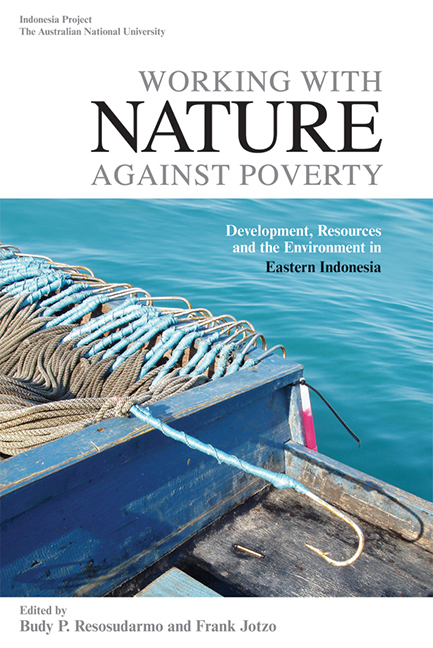Book contents
- Frontmatter
- Foreword
- Contents
- Figures and Maps
- Tables
- Contributors
- Acknowledgments
- Glossary
- Map
- 1 Development, Resources and Environment in Eastern Indonesia
- PART I ECONOMIC DEVELOPMENT AND POVERTY ALLEVIATION
- PART II NATURAL RESOURCES AND THE ENVIRONMENT
- PART III CONFLICT, LOCAL DEVELOPMENT AND HEALTH
- Index
Foreword
Published online by Cambridge University Press: 21 October 2015
- Frontmatter
- Foreword
- Contents
- Figures and Maps
- Tables
- Contributors
- Acknowledgments
- Glossary
- Map
- 1 Development, Resources and Environment in Eastern Indonesia
- PART I ECONOMIC DEVELOPMENT AND POVERTY ALLEVIATION
- PART II NATURAL RESOURCES AND THE ENVIRONMENT
- PART III CONFLICT, LOCAL DEVELOPMENT AND HEALTH
- Index
Summary
The development challenge is joined by humanity in many different environments. Small and isolated communities face many special challenges. This book describes and analyses those challenges in an important and interesting context: three eastern provinces of the Republic of Indonesia.
Small and/or isolated economies face unusually large costs in participating in trade and specialization. They find it difficult to catch the attention of owners of capital in all its forms. They are at a disadvantage in the supply of public goods of all kinds that are necessary for development—from governance, to transport, to communications infrastructure—because costs fall with scale.
These and other disadvantages of small size and isolation are well represented in the stories presented in this book about development and the environment in Papua, Maluku and East Nusa Tenggara. Budy P. Resosudarmo and Frank Jotzo present a set of chapters that brings out in rich detail the nature of the development challenge in these provinces, the response to it and the lessons from experience so far.
These are relatively poor regions within Indonesia, in income, health, education and other ways. Poverty has so far been impervious to development efforts.
In these three eastern Indonesian provinces, limitations on scale are even more acute below the level of the province. In each of them, internal integration is blocked by ocean, swamp or mountain, so that the effective economic size of communities for purposes of development is smaller again.
These characteristics of scale and location are as old as human society in these regions. This means that populations have not expanded as close to the limits of resource availability as in places that are better located for trade, specialization and economic growth. As a result, natural resource endowments tend to be large relative to population. The three provinces are all rich in natural resources relative to population, with Papua being exceptional on a global as well as a national scale.
- Type
- Chapter
- Information
- Working with Nature against PovertyDevelopment, Resources and the Environment in Eastern Indonesia, pp. v - viPublisher: ISEAS–Yusof Ishak InstitutePrint publication year: 2009



